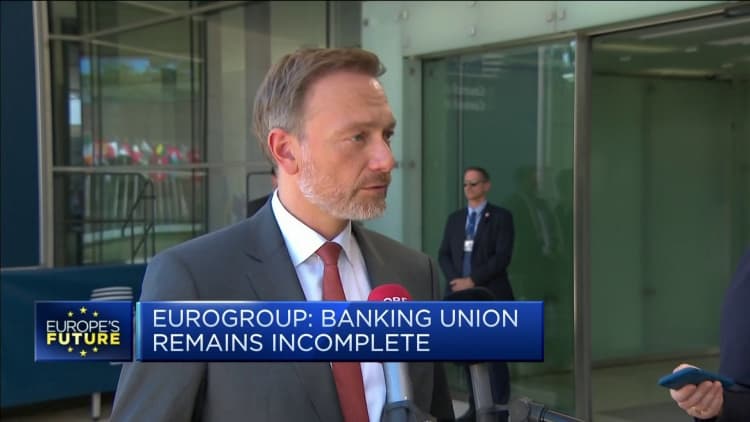The euro zone is to discuss changing its fiscal rules – a task that could have market repercussions.
Bloomberg | Bloomberg | Getty Images
The euro zone will soon reveal changes to its fiscal rules — a move that could have significant repercussions for government borrowing costs and the region’s bond markets.
The European Commission, the executive arm of the EU, will next week present a proposal to reform the fiscal rules that have been in place for almost 30 years. The rulebook has been criticized for being too opaque, for being too hard to implement and for not being well-enforced.
“Simplification, stronger national ownership and better enforcement will be the defining features of an improved framework, with the overall objective of supporting debt sustainability and sustainable growth,” Paolo Gentiloni, Europe’s economics commissioner, said at an event in October.
Why is the euro zone revising its rules?
Fiscal discrepancies among euro zone member states (which share the euro currency) have always been a contentious topic in the region and have sparked division among them.
To mention just one example, France repeatedly breached deficit rules and was never fined despite what the legislation stipulated. This would then ease pressure on smaller euro economies, which were also breaching deficit targets to correct their fiscal stances. At the same time, Germany and the Netherlands would blame the European Commission for not enforcing the rules with fines.

However, the Covid-19 pandemic brought similar economic tensions across the region, forcing governments to spend significantly more to tackle the health crisis — which translated in higher public debts across the bloc. The fact that they were all facing this challenge added weight to the idea that they needed to update the fiscal rulebook.
Therefore, the main idea in revising the rules now is to help euro nations correct their debt levels. At the end of the second quarter, government debt stood at 94.2% of GDP across the 19-member region. It jumped from 86% at the end of the first quarter in 2020 to 99.6% at the end of the first quarter of 2021 off the back of higher costs associated with the pandemic.
The need to correct fiscal stances becomes ever more relevant at a time of war in Europe, an energy crisis and severe cost-of-living pressures.
What could they look like?
“We want to move towards more tailored requirements based on debt stainability,” an EU official who is working on preparations for the proposals, told CNBC.
The rulebook stipulates that nations should not have a debt pile above 60% of their GDP (gross domestic product). This benchmark is not changing, according to the same official who preferred to remain anonymous as the details are not yet public.
But it is naturally harder for Greece and Italy to comply with this threshold given their debt ratios sit above 150%. Germany’s sovereign debt stood at just below 70% of its GDP at the end of 2021.
The same official said the plan is to have the commission conduct a debt sustainability analysis for each country and then design a set of actions to help each nation correct their fiscal positions. They would have a precise timeline to do it with milestones to achieve during that period. Member states would have a say in the preparation of this set of actions.
However, the question that some capitals will have over the new plan is how the European Commission will enforce it.
“The rules currently leave a lot of room for discretionary judgement by the commission and the council [which is made up by the member states],” Dutch Finance Minister Sigrid Kaag said in a letter sent to the European Commission last week and seen by CNBC.
She added this “causes rules to be applied in a nontransparent and sometimes inconsistent manner. This should be addressed in the upcoming review.”
The message follows previous comments made by the German Finance Minister Christian Lindner who also wants the upcoming changes to boost enforcement of the rules.
Markets are watching
Market players will be watching out for the details and how the discussions will evolve in the coming months.
“Interest burden on large public debt to GDP ratios is set to increase significantly in the years ahead. It is thus key to implement simpler yet credible rules to ensure public debt sustainability, while managing European economies medium term challenges — demographics, energy and green transitions,” François Cabau, euro zone economist at AXA Investment Managers, told CNBC via email.
European governments are facing higher costs when tapping the markets as interest rates are normalized. This marks a significant change from the ultra loose monetary policy that has been in place in the euro zone for the last decade.
The yield on Italy’s 10-year government bond, for instance, traded at 4.463% on Thursday. Throughout 2020 and 2021, the same yield stood mostly below 2%.
Henry Cook, economist at MUFG bank, said that “ideally, any update to the fiscal rules would allow a greater degree of flexibility related to each member state’s individual circumstances while also having credible sanctions for flagrant breaches.”
“The most likely outcome is that the EU continues to muddle along with plenty of leeway given to national governments when it comes to fiscal choices,” he added.
Any signs that countries are not committed in correcting their fiscal stances could push up their borrowing costs even more.
When will these kick in?
Regardless of the details that will be presented next week, it is likely that they will start a long debate among the finance ministers of the euro area.
This means that in a optimal scenario, the fiscal rules will be changed from 2024 onward. A second EU official, who did not want to be named due to the sensitivity of the upcoming talks, said there needs to be an agreement before the 2024 EU parliamentary elections and hence before the political debate focuses on this vote.


